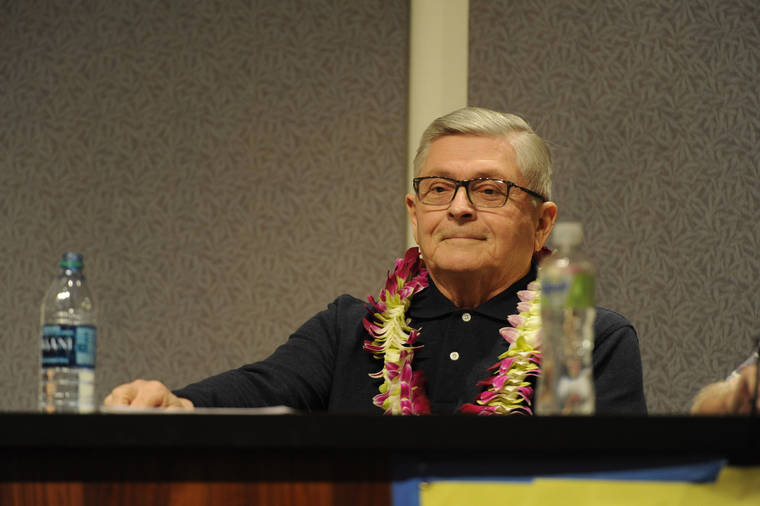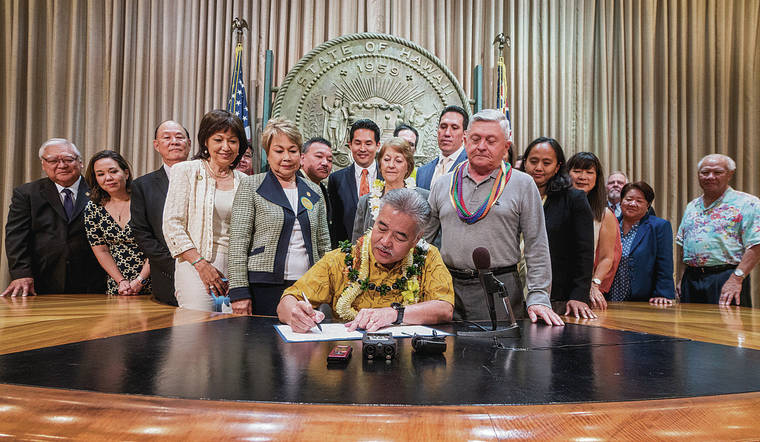John Radcliffe / 1942-2020: Fought for dignity for the dying

STAR-ADVERTISER / JAN. 2017
John Radcliffe: 1942-2020

STAR-ADVERTISER
John Radcliffe’s right-to-die lawsuit led to House Bill 2739 “Our Care, Our Choice Act.” Gov. David Ige signed the bill into law on April 5, 2018, making Hawaii the seventh jurisdiction to codify an end-of-life choice. The law was modeled after Oregon’s Death with Dignity Act and allows qualified terminally ill adults who are mentally competent to legally obtain prescription medication to end their life in a humane and dignified manner. Radcliffe, who was diagnosed with cancer at the time, is standing to the right of Ige.


John Radcliffe, an educator, lobbyist, former executive director of the Hawaii State Teachers Association and unrelenting advocate for death with dignity, died Tuesday night in his Makiki home surrounded by family and close friends after ending his life with prescribed medication, said family friend J.N. Musto.
He was 78 years old.
After receiving a diagnosis of terminal cancer in 2014, Radcliffe fought to legalize medical aid in dying and was instrumental in securing the passage of Hawaii’s Our Care, Our Choice Act, which took effect Jan. 1, 2019.
“John was a fierce advocate, and throughout his career he spoke for those who didn’t have a voice,” said Gov. David Ige, who signed the act into law in 2018.
“He wasn’t afraid to take on issues he cared about, right up until the end,” Ige said. “He was most passionate about helping our public school and university students, and his impact will be felt for generations.”
In an interview with former Star- Advertiser staff writer Lee Cataluna in late June, Radcliffe, a former teacher who came to Hawaii in 1975 to head HSTA, said “coming to Hawaii” and “being accepted here,” was one of the best things that had happened to him.
Don't miss out on what's happening!
Stay in touch with breaking news, as it happens, conveniently in your email inbox. It's FREE!
“John Radcliffe was the longest serving executive director at HSTA,” said Wilbert Holck, HSTA executive director. “Over his 13 years here, John guided us through very turbulent times. He was a fierce advocate for public education, our children, and our teachers.”
Under Radcliffe, HSTA demanded safe working conditions for teachers in Hawaii schools, and one of his first steps as executive director was to begin to move the organization into political action, said Joan Husted, who served as the organization’s chief negotiator from 1971-2007.
“John convinced our board and staff that we needed to get politically involved if we wanted to improve public education and ensure it got the money it needed,” Husted said.
As a manager, Radcliffe was an excellent mentor, she added, with a sense of humor that lightened up tense situations.
“I always appreciated John could tell you what you could have done better without making it sound like you did something wrong,” Husted said. “That’s a rare gift.”
Radcliffe left HSTA to make an unsuccessful run for Congress, after which Musto, then-executive director for the University of Hawaii Professional Association, hired him as his deputy.
He chose Radcliffe because, “I wanted to develop a political, governmental aspect to the faculty union,” said Musto, now a member of the Hawaii Labor Relations Board.
When UHPA members went on strike in 2001, “John was right there, (and) he was marvelous,” he added.
Radcliffe went on to a career change in 2003, becoming a registered lobbyist, and eventually co-founding Capitol Consultants of Hawaii, a lobbying firm that took on dozens of clients each legislative session, with George “Red” Morris.
It was during this phase of his professional life that Radcliffe “got the most criticism,” Musto said, “because people substituted his personal beliefs for those of the clients in the private sector he represented.”
Those clients included tobacco company RJ Reynolds, “but John didn’t advocate smoking,” Musto said.
“His view was that our government set up a system that allows corporations to be able to petition the government, and (he was) just assisting in giving them voice.”
Musto added that Radcliffe was “a very decent human being, generous to a fault,” who he had come to think of as a brother and whose tough childhood inspired his choice of an educational career.
“John had a very challenging upbringing as a boy in Tomahawk, Wis.,” Musto said. “With his mother most of the time institutionalized for tuberculosis, he was raised by his dad but mostly by his older sister, and said he kept out of prison or the army by going to college.”
Radcliffe, who was born on May 25, 1942, earned a bachelor of science degree in education from the University of Wisconsin.
In Hawaii, Radcliffe was active with the Boy Scouts, Red Cross and Aloha United Way, “and was a surrogate father to kids who didn’t probably have that connection,” Musto said.
In recent years, Musto said, Radcliffe was contacted by a son of whose existence he had been unaware and who, with his wife and family, were embraced by the Honolulu Radcliffe ohana, whom they have visited many times.
In the last days of Radcliffe’s life, “he was in terrible pain,” said Husted, who last spoke with her friend and mentor about 10 days before his death.
But Radcliffe died peacefully and painlessly by his own hand in his bed, surrounded by his wife of 57 years, Diane Radcliffe, his daughter Romala Sue Radcliffe and her partner David Langille, his physician and a few close friends, including himself, Musto said.
“I watched him take the medication; he mixed it in a liquid form,” he said. “After he took the liquid, he had a little ice cream afterwards, and went to sleep, and progressive deeper sleep.”
In June, when Radcliffe was receiving visits from friends coming to say goodbye, “I’m the most grateful guy in the world,” he told the Star-Advertiser.
“My life has been wonderful. My family is solid.”
In addition to his wife and daughter, Radcliffe is survived by son Dan Sutton (Ruth), grandsons Dan Jr. and Tom and brother Joe (Gayle) of Wisconsin, Sister Toni Grage of Arizona and four great-grandchildren.
Services are pending.
Star-Advertiser staff writer Gordon Pang contributed to this report.




